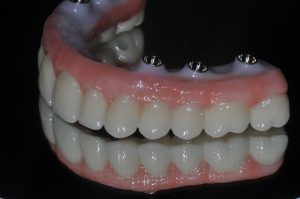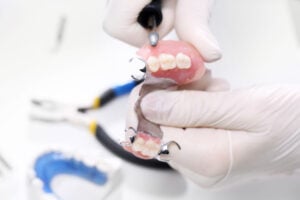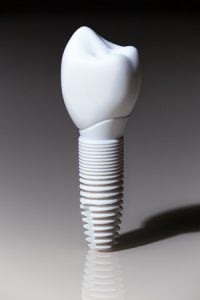A person’s smile is their calling card. Missing teeth can diminish that smile and rob them of their confidence and ability to talk or eat contentedly. That’s why permanent dentures might be an option for someone who has lost some or all of their original teeth. Permanent dentures, also called implant-supported dentures, are similar to traditional ones, but they provide the benefits that removable dentures often cannot deliver.
Permanent dentures can be complete or partial. While removable dentures rest on the gums, permanent dentures remain fixed to the jawbone with two or more implants. With their implant supports, permanent dentures are more robust and secure than alternative methods for replacing teeth.
Regardless of the method, replacing missing teeth preserves a person’s smile and facial appearance. On the other hand, leaving tooth gaps causes facial muscles to droop, making a person look older. Also, it’s more difficult to eat foods and talk without a full set of teeth.
Table of Contents
Cost of Permanent Dentures
The cost of permanent dentures varies based on patient needs. More specifically, procedure pricing depends on whether the patient needs tooth extraction before the implants can be placed and how many implants are required. Nevertheless, the range for a permanent implant denture is between $20,000-$50,000 per arch (upper/lower). The fees can vary greatly depending on the bone quality, number of implants required and the quality of the restoration desired. Dental insurance doesn’t usually help too much with these cases. The maximum yearly benefit of a dental plan is usually capped at $1,000-$2,000. Financing options are usually available through third-party lenders if needed.

Advantages of Permanent Dentures
Overall, dental implant surgery is safe and effective, and permanent dentures can last a lifetime. Also, unlike traditional dentures that can rub against the gums and move around, implant-supported dentures stay in place, preventing discomfort and pain.
Permanent dentures are also easier to keep clean than removable ones. This is because the wearer doesn’t need to remove and soak them at the end of the day. Care is relatively simple with twice-daily brushing, Waterpik, interdental brushing, and regular dental check-ups.
Removing all of the teeth from the bone generally leads to progressive bone loss in a denture patient. When dental implants are placed in the jaw and loaded with an implant denture, it stimulates the bone and leads to preservation of the existing bone. Some studies have even showed bone growth to occur following a full arch implant denture functioning for years.
Permanent dentures can give the patient more confidence when speaking or eating. That’s because, unlike traditional dentures, permanent false teeth are more stable, and they won’t slip or become dislodged. Wearers can avoid embarrassment when sharing meals or engaging in conversation. Moreover, food might taste better because permanent dentures don’t cover the roof of the mouth.
Disadvantages of Permanent Dentures
Installation of permanent false teeth can be a complex process, especially if existing teeth need extraction. When a patient has teeth removed, they receive temporary dentures and have to go through a waiting period before they can undergo implants. Also, patients who don’t have enough healthy bone in their jaw will require bone grafting for the implants to attach properly. It is a bit more straight-forward of a procedure for patients already wearing a removable denture but the procedure is also done routinely on patients having teeth removed. There is still a transitional period in which your diet is restricted to soft/liquid foods for 12 weeks to allow the dental implants to adhere to the bone (called osseointegration).
Expense is another factor that patients should consider. Permanent dentures’ cost, including prosthetic replacement and surgery, makes them less affordable than other teeth replacement options.
As with any dental surgery, permanent denture placement comes with a slight risk of infection and inflammation. Also, chronic conditions like diabetes can get in the way of proper healing after surgery. Therefore, not all patients are good candidates for permanent dentures.
Although permanent dentures come with relatively few risks, they do require a well-trained dental specialist for placement. As of 2021, the ADA does not recognize dental implants as a specialty, however, the MIII (Misch Implant Institute) and ICOI both offer recognized fellowships in dental implant therapy. Patients should always discuss the procedure in detail with a provider to ensure they know all the pros and cons.
Alternatives to Permanent Dentures
Removable Dentures

With today’s technology, removable dentures are more comfortable than ever before. Although this solution might not always feel as natural as real teeth, traditional dentures look very realistic and fit securely. However, patients need to remove their dentures before going to bed and for regular cleaning.
It can take a few months to build dentures that look natural and fit properly in the mouth. Patients will need to replace or reline their dentures due to weight fluctuations or changes in the shape of the mouth or jaw. A reline is usually required once every three years due to the progressive bone loss which occurs under a complete denture.
Removable dentures consist of acrylic and replace a complete set of teeth on the lower or upper jaw. Upper dentures cover the gum area and the roof of the mouth, and they stay in place with suction. Lower dentures are shaped like a horseshoe, leaving space for the tongue, and they don’t require suction to remain secure.
Permanent Dentures vs. Implants

- Dental Implant Pros and Cons - August 26, 2023
- Receding Gums Stages - August 12, 2023
- When Is It Too Late for Gum Grafting? - July 8, 2023


